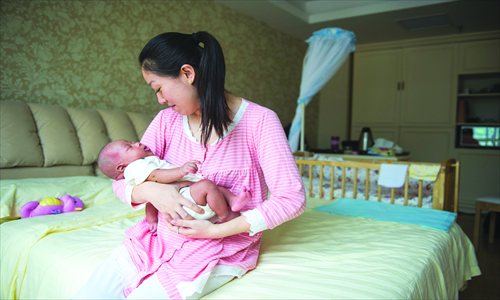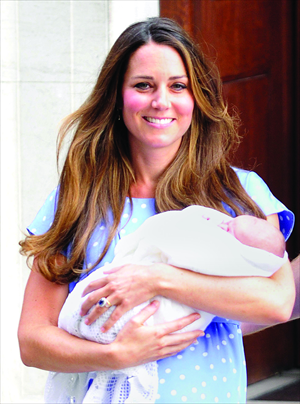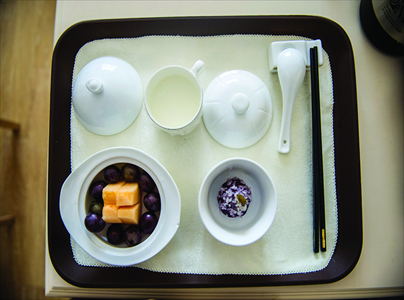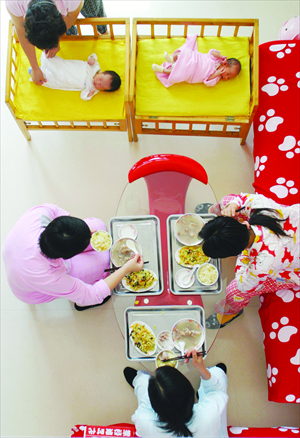Postnatal suppression

Han Bing nurses her newborn son at a high-end Beijing yuezi center where mothers recover after giving birth. Photo: Li Hao/GT
Shortly after the birth of their son George Alexander Louis in late July, British royal couple Prince William and Catherine Middleton made their first public appearance cradling the newborn. Middleton, the Duchess of Cambridge, posed before the flash of media photographers just 27 hours after giving birth to her son. It was a feat that defied traditional Chinese beliefs that hold mothers should zuo yuezi, or endure a month of confinement after giving birth.

Catherine Middleton cradles her newborn son, George Alexander Louis, in July. Photo: CFP
The logic behind the phenomenon is that mothers and their newborns should not be exposed to cold air during the yuezi period, which typically spans 42 days after childbirth. This period of house arrest also aims to help mothers regain strength and ensure their well-being by not washing their hair or body, avoiding exercise, not brushing their teeth and only eating hot foods. Many of these customs are enshrined in The Book of Rites, a classic Western Han Dynasty (206 BC-AD 25) text that details ancient Chinese practices.
The idea of neglecting personal hygiene and staying indoors for over a month is perhaps unappealing to some mothers overseas, who would prefer to celebrate motherhood by parading their babies before relatives and friends and embarking on a vigorous exercise regime to shed leftover pregnancy weight.
Indeed, yuezi customs such as eating high-protein foods and avoiding strenuous activity can spearhead a faster recovery during the postnatal period. But other customs, like feeding newborns honeysuckle herbs, have raised concerns that maternal confinement could be more trouble than it's worth.
Elsewhere in Asia, similar postnatal traditions thrive. In Vietnam, mothers often spend yuezi in a bed over a lit fire pan. Similarly, Korean mothers stay indoors and resist bathing immediately after childbirth. Many also consume kelp soup to promote lactation.
But does yuezi represent a regional phenomenon? Some experts have no doubt, arguing that most non-Chinese mothers, particularly in Western countries, have no need to adhere to confinement because of their regular protein-rich diets and bodies' tolerance of cold foods and drinks.
Yuezi for the elite
Dressed in pink-and-white pajamas, Han Bing lies sprawled on a comfortable chair in her room at the Better Care Confinement Club, a high-end yuezi center located in Tongzhou district. A staff member at the other side of the airy suite shaves her newborn son's fuzzy clumps of hair, a custom believed to help his scalp sprout thick, dark hair.
Han, 33, has enjoyed a leisurely pace of life for the past 30 days. Because she gave birth to her son naturally and without any complications, her yuezi period is likely to end sooner due to her body's speedier recovery.
Han, who paid almost 80,000 yuan ($13,066) for her stay at the Better Care Confinement Club, has spent most of her time resting while nurses care for her son. Boasting a radiant appearance, the mother-of-two explained she didn't hesitate to plan her yuezi retreat once she found out she was pregnant.
"I've had a good rest this month and feel great," Han said. "I'm not that sure that staying confined during yuezi is that effective at restoring health, but I firmly believe that having a good rest is important. Furthermore, I don't need to stress about my baby here because he is being cared for by staff."
Although Han studied in Canada for six years, her time overseas didn't influence her perceptions about postnatal healthcare.
"Yuezi is a form of food therapy. It allows mothers to detox and have a good rest after pregnancy," she said.
Since giving birth, Han has received weekly visits from a traditional Chinese medicine (TCM) doctor who offers nutritional advice.
"When my body temperature was too high, the doctor advised me to eat watermelon instead of sweet potatoes. None of the fruits I ate were refrigerated. I also ate white fungus to nourish my yin," said Han, referring to the Taoist concept of yin and yang.
Now that she is nearing the end of her yuezi period, Han has started eating yogurt, grapes and cantaloupe. All are traditionally regarded as forbidden fruits because of their categorization as "cold foods," but they have been recommended to Han because her yuezi stint is almost over.

Han Bing's serving of yogurt, grapes and cantaloupe. Photo: Li Hao/GT
To bathe or not to bathe?
Han did not bathe for the first two weeks after giving birth, although during this period staff wiped down her body and hair with towels soaked in Chinese herb-infused water.
Li Yuetao, who gave birth to a daughter three months ago, spent her yuezi period at home. Li, who also didn't bathe for her first two weeks after childbirth, defied medical advice by staying clear of her soap and shampoo.
"The doctor told me I could take a shower two days after giving birth. I decided not to bathe for the first two weeks after giving birth because I still felt painful," said Li, who had an episiotomy - a small incision to enlarge the vaginal opening - during childbirth.
Ren Yingchun, president of the Better Care Confinement Center and a former head nurse at Beijing Friendship Hospital's gynecology and obstetrics department, encourages mothers to bathe after giving birth because good hygiene is especially important for mothers with weak immune systems embarking on yuezi.
Li said her TCM doctor prescribed some medicines to take after leaving hospital that aimed to help expel lochia, or postnatal vaginal discharge, and help improve blood circulation.

Recovering mothers eat alongside their newborns at a yuezi center. Photo: CFP
Differences in the West
Jen Snailham, 37, gave birth to her two children in Germany and England. She noted that it is "very common" for mothers to liaise with medical staff after giving birth.
"It's standard to have a midwife come at reasonable intervals to check up for at least the first couple of weeks. It's usually an hour at a time the day after birth, then every couple of days," said Snailham, an American. "People everywhere recognize that mothers need to rest and recover [after childbirth]. In the UK, friends help out by bringing meals over, but there's no prescribed diet nor specific recipes."
Snailham said new mothers in Germany are not given specific nutritional advice after giving birth. "There aren't a lot of superstitions. They just tell you to eat enough," she said.
Ying Chow, 42, who gave birth to her two children in the US, said that she didn't have any clear-cut postnatal plan after her children were born.
"I don't remember getting many specific recommendations, certainly not to the extent that new Chinese mothers do. I can't even recall any nutritional advice. Regarding post-pregnancy weight loss, the general advice was to take it slow. The doctor told me, 'It took nine months to gain, so expect it to take nine months to get back to your pre-pregnancy weight,'" said Chow.
Helpful or just hocus-pocus?
Fu Yu, 33, doesn't consider postnatal confinement necessary based on her own experience as a mother. Fu, who gave birth to her daughter in 2011, was out of bed and on her way to Tianjin from Beijing on the seventh day after giving birth.
"I acted as I had before [giving birth]. I washed clothes for my daughter and went to see people throughout the postnatal period," she said.
Fu didn't encounter any discomfort from being out and about after giving birth, but she acknowledges that getting plenty of rest is essential for new mothers.
Li admitted that after a month of being bedridden her heels ache more often than normal - a side effect of not wearing proper footwear throughout yuezi.
Wu Shaowen, a gynecologist at the Beijing Obstetrics and Gynecology Hospital, noted that it is important for women to avoid cold environments after childbirth regardless of whether they abide by yuezi or not.
It's a message that Ren echoes.
"When a woman gives birth, all her bones and joints are vulnerable. This makes it easy for cold air to penetrate the body and can increase her risk of getting arthritis," said Ren.
Wu disagrees with Ren's claim that Chinese mothers' postnatal confinement is essential because of diet differences with mothers from other countries. The yuezi phenomenon is only a social custom that doesn't deserve too much attention, Wu claimed.
"Women can live as they would ordinarily during the postnatal period. They don't need to fuss about eating too much of this or that after childbirth," Wu said.